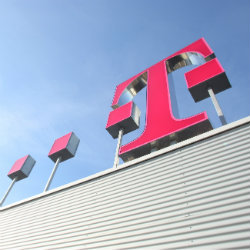
Germany's Deutsche Telekom has finally been able to introduce a commercial 5G service in its domestic market after local authorities released the 3.6GHz spectrum it acquired for €1.3 billion ($1.4 billion) in a June auction.
Last month, the operator was forced to acknowledge it still lacked a 5G offer, despite a "launch" announcement in July, due to spectrum unavailability. The situation has left Deutsche Telekom lagging its main rival Vodafone, which has been using 3.5GHz spectrum it acquired in 2018 to provide 5G services, it told Light Reading.
But the partly state-owned incumbent can now join Vodafone in Germany's nascent 5G market after the Bundesnetzagentur, which regulates the telecom sector, said it had assigned spectrum to Deutsche Telekom's domestic subsidiary following an application.
According to the Bundesnetzagentur's statement, Vodafone and new mobile entrant Drillisch have also made applications for spectrum assignment that will be "decided on shortly." The update leaves a question mark over Telefónica Deutschland, Germany's other mobile operator, which also picked up spectrum in the June auction.
Vodafone previously indicated it would have to relinquish its 42MHz block of 3.5GHz spectrum on receipt of the 90MHz license it secured during the government auction.
Deutsche Telekom's fledgling 5G service remains limited to parts of Berlin, Bonn, Cologne, Darmstadt and Munich, with just 129 5G antennas -- including 66 in Berlin alone -- currently supporting 5G connectivity.
Under existing plans, Deutsche Telekom aims to have 300 5G antennas at 100 mobile sites by the end of the year. While these may cover some of Germany's busiest areas, including parts of Hamburg and Leipzig, they will account for only a tiny fraction of the 29,000 mobile sites that Deutsche Telekom maintains.
Next year, Deutsche Telekom intends to bring 5G into 20 of Germany's biggest cities, and, under stringent regulatory obligations that operators have fought, it will have to provide a mobile service of at least 100 Mbit/s for 98% of households by the end of 2022.
License winners have complained that Germany's 5G auction was structured to maximize proceeds, leaving them short of the funds they need to rapidly deploy 5G networks. The sale eventually raised about €6.5 billion ($7.2 billion), exceeding analyst expectations, after regulators held back 100MHz for industrial groups. Bidding by a fourth contestant in the shape of Drillisch also drove up prices.
Despite the complaints, Deutsche Telekom continues to guide for overall capital expenditure at its German telecom business of about €4.2 billion ($4.6 billion) this year on top of any spectrum fees -- the same amount it spent in 2018.
Want to know more about 5G? Check out our dedicated 5G content channel here on
Light Reading.
Providing a more detailed breakdown of 5G antennas per city, it revealed that Bonn has 24 antennas, Cologne has 12, Darmstadt has 18 and Munich has nine. Bonn, Cologne and Munich are expected to have 40, 90 and 50 5G antennas respectively by the end of the year. Deutsche Telekom did not provide antennas forecasts for Berlin or Darmstadt.
In the first instance, the operator is introducing 5G at existing 4G sites, where it uses radio access network equipment from China's Huawei and Sweden's Ericsson.
Ericsson has yet to include Deutsche Telekom on its coverage map of "live" 5G networks, suggesting the operator's initial 5G services may be running exclusively over Huawei equipment.
That may aggravate opponents of the Chinese vendor including US authorities that have pushed for its exclusion from Western 5G markets on grounds of national security. UK operators BT and Vodafone are also providing 5G services on Huawei network equipment.
In today's update, Deutsche Telekom said it would continue to expand its 4G footprint to cover rural areas that currently lack mobile broadband services. By 2021, it aims to have 36,000 mobile sites across Germany.
The site "densification" should support the operator's future 5G plans, with CEO Timotheus Höttges previously indicating that Deutsche Telekom would require about 50,000 mobile sites to blanket the whole of Germany with a 5G service.
Related posts:
— Iain Morris, International Editor, Light Reading
Read more about:
EuropeAbout the Author(s)
You May Also Like










